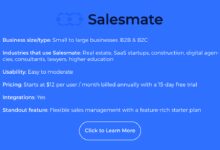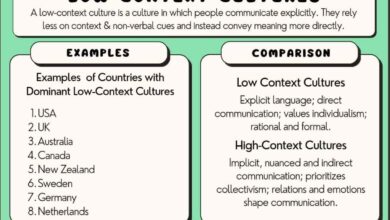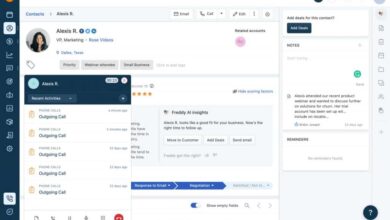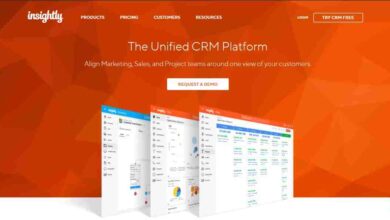Compare Sales CRM software for small business options: Compare Sales CRM Software for Small Business: 7 Best Options Revealed
Running a small business means wearing many hats — and managing customer relationships shouldn’t be the heaviest one. That’s why choosing the right CRM is crucial. Let’s compare sales CRM software for small business options that deliver real value without breaking the bank.
Why Small Businesses Need a Sales CRM

For small businesses, every customer interaction counts. A solid CRM system helps track leads, manage sales pipelines, and nurture relationships — all from one centralized platform. Without one, teams risk losing deals, duplicating efforts, or missing follow-ups.
Streamline Sales Processes
CRM software automates repetitive tasks like data entry, follow-up reminders, and email sequences. This frees up time for sales reps to focus on closing deals rather than administrative work. According to Salesforce, companies using CRM see a 29% increase in sales performance.
- Automated lead capture from websites and forms
- Task scheduling and calendar integration
- Real-time tracking of customer interactions
Improve Customer Retention
Retaining customers is far more cost-effective than acquiring new ones. A CRM stores every touchpoint — calls, emails, purchases — so your team can deliver personalized service. This builds trust and increases lifetime value.
“A CRM isn’t just a sales tool — it’s a customer experience engine.” — HubSpot Blog
Key Features to Look for When You Compare Sales CRM Software for Small Business Options
Not all CRMs are created equal. When you compare sales CRM software for small business options, focus on features that align with your workflow, budget, and growth goals.
Contact and Lead Management
The foundation of any CRM is its ability to organize contacts and leads. Look for systems that allow tagging, segmentation, and custom fields. This helps prioritize high-value prospects and personalize outreach.
- Import contacts from email, spreadsheets, or social media
- Track lead source and engagement history
- Assign leads to team members automatically
Sales Pipeline Visualization
A visual pipeline shows where each deal stands — from initial contact to close. This transparency helps managers forecast revenue and identify bottlenecks. Tools like drag-and-drop stages make it easy to update deal progress.
Compare Sales CRM software for small business options – Compare Sales CRM software for small business options menjadi aspek penting yang dibahas di sini.
For example, Zoho CRM offers customizable pipeline views with color-coded stages, helping teams stay on track.
Top 7 Sales CRM Software for Small Businesses
Let’s dive into the best CRM platforms tailored for small businesses. We’ve evaluated each based on pricing, ease of use, scalability, and essential sales features. These are the top contenders when you compare sales CRM software for small business options.
1. HubSpot CRM
HubSpot CRM is a favorite among small businesses for its powerful free plan and seamless integration with marketing tools. It’s intuitive, cloud-based, and scales as your business grows.
- Free forever plan with unlimited users
- Email tracking, meeting scheduling, and live chat
- Integration with Gmail, Outlook, and Slack
Paid tiers unlock advanced features like automation, reporting, and custom workflows. Visit HubSpot’s official site to explore pricing.
2. Zoho CRM
Zoho CRM offers deep customization and AI-powered insights through Zia, its virtual assistant. It’s ideal for businesses that want flexibility without complexity.
- AI-driven sales forecasting and lead scoring
- Multi-channel communication (email, phone, social)
- Mobile app with offline access
Zoho also integrates with over 40 Zoho apps and third-party tools like QuickBooks and Mailchimp. Learn more at Zoho CRM.
3. Salesforce Essentials
Salesforce isn’t just for enterprises. Essentials is a simplified version designed specifically for small sales teams with up to 10 users.
Compare Sales CRM software for small business options – Compare Sales CRM software for small business options menjadi aspek penting yang dibahas di sini.
- Pre-built sales processes and templates
- Real-time dashboard and reporting
- Integration with email, calendar, and file storage
While pricier than some alternatives, it offers enterprise-grade reliability. Explore it at Salesforce Essentials.
4. Pipedrive
Pipedrive is built by salespeople, for salespeople. Its visual pipeline-centric design makes it easy to manage deals and forecast revenue.
- Drag-and-drop deal management
- Activity reminders and workflow automation
- Mobile app with voice-to-text notes
It’s especially popular with startups and solo entrepreneurs. Check out Pipedrive for a free trial.
5. Freshsales (by Freshworks)
Freshsales combines CRM with built-in phone, email, and chat capabilities. Its AI-powered lead scoring helps prioritize the hottest prospects.
- Click-to-call and voicemail drop features
- Behavioral tracking (email opens, link clicks)
- Customizable dashboards and reports
The platform is user-friendly and scales well. Visit Freshsales for details.
6. Insightly
Insightly stands out for project-based businesses. It blends CRM with project management, making it ideal for service providers and consultants.
- Project and task tracking within CRM
- Relationship linking (e.g., contacts to projects)
- Workflow automation and email integration
It supports complex sales cycles and team collaboration. Learn more at Insightly.
Compare Sales CRM software for small business options – Compare Sales CRM software for small business options menjadi aspek penting yang dibahas di sini.
7. Agile CRM
Agile CRM offers a robust all-in-one suite with marketing, sales, and service tools. It’s a great fit for businesses wanting an integrated solution at a low cost.
- Marketing automation (email campaigns, landing pages)
- Telephony and web analytics
- Customer support ticketing system
The free plan supports up to 10 users, making it accessible. Explore Agile CRM for more.
Pricing Comparison: Finding the Best Value
When you compare sales CRM software for small business options, pricing is a critical factor. Most platforms offer tiered plans, but value depends on features, user count, and long-term scalability.
Free Plans and Entry-Level Tiers
Several CRMs offer free versions with core functionality:
- HubSpot CRM: Free forever, unlimited users
- Agile CRM: Free for up to 10 users
- Zoho CRM: Free for up to 3 users
These are excellent for startups testing the waters. However, advanced features like automation and reporting usually require upgrades.
Mid-Tier and Premium Pricing
As your team grows, so do costs. Here’s a snapshot of monthly pricing per user (billed annually):
- Pipedrive: $14.90–$99
- Freshsales: $15–$79
- Zoho CRM: $14–$52
- Insightly: $29–$79
- Salesforce Essentials: $25/user
Consider your team size and required features. Sometimes, a slightly higher price delivers better ROI through automation and integrations.
Compare Sales CRM software for small business options – Compare Sales CRM software for small business options menjadi aspek penting yang dibahas di sini.
Integration Capabilities: Connecting Your Tech Stack
A CRM shouldn’t exist in isolation. When you compare sales CRM software for small business options, check how well it integrates with tools you already use — email, calendars, accounting, and marketing platforms.
Email and Calendar Sync
Top CRMs sync with Gmail and Outlook, automatically logging emails and meetings. This ensures no communication is missed and keeps the CRM updated in real time.
- HubSpot and Zoho offer two-way sync
- Pipedrive logs emails with a Chrome extension
- Freshsales tracks email opens and link clicks
Accounting and Payment Tools
For seamless operations, integrate your CRM with accounting software like QuickBooks, Xero, or Stripe.
- Zoho CRM integrates natively with Zoho Books
- Freshsales connects with Stripe for invoicing
- Salesforce offers AppExchange for third-party apps
These connections reduce manual data entry and improve accuracy in billing and forecasting.
User Experience and Onboarding
No matter how powerful a CRM is, it’s useless if your team won’t use it. Ease of use and onboarding support are critical when you compare sales CRM software for small business options.
Intuitive Interface Design
Look for platforms with clean dashboards, drag-and-drop functionality, and mobile accessibility.
- Pipedrive’s pipeline view is praised for simplicity
- HubSpot uses a conversational UI that feels natural
- Zoho allows extensive customization without coding
A clutter-free interface reduces training time and increases adoption.
Compare Sales CRM software for small business options – Compare Sales CRM software for small business options menjadi aspek penting yang dibahas di sini.
Onboarding and Customer Support
Even the easiest CRM requires some setup. Evaluate onboarding resources:
- Tutorials and knowledge bases (e.g., HubSpot Academy)
- Live chat and email support (available in most paid plans)
- Dedicated onboarding specialists (offered by Salesforce and Insightly)
Agile CRM and Freshsales offer video walkthroughs, while Zoho provides 24/5 phone support on higher tiers.
Scalability and Long-Term Growth
Your CRM should grow with your business. When you compare sales CRM software for small business options, consider how well each platform supports expansion — more users, locations, or product lines.
Customization and Automation
As your sales process evolves, you’ll need to adapt your CRM. Look for tools that allow:
- Custom fields, modules, and workflows
- Automated task assignment and follow-ups
- Role-based permissions for team members
Zoho and Salesforce excel here, offering low-code customization options.
Multi-User and Team Collaboration
Small businesses often start with one or two users but may scale to ten or more. Ensure the CRM supports team collaboration features:
- Shared calendars and activity feeds
- Internal commenting on deals
- Performance tracking and leaderboards
HubSpot and Pipedrive offer team productivity tools that enhance accountability.
Compare Sales CRM software for small business options – Compare Sales CRM software for small business options menjadi aspek penting yang dibahas di sini.
Security and Data Privacy
Your CRM holds sensitive customer data. Security must be a top priority when you compare sales CRM software for small business options.
Data Encryption and Compliance
Ensure the CRM provider uses end-to-end encryption and complies with standards like GDPR, CCPA, and SOC 2.
- Salesforce and HubSpot are GDPR-compliant
- Zoho offers data residency options (EU, US, India)
- Freshsales uses SSL/TLS encryption for data in transit
Backup and Recovery
Data loss can be catastrophic. Check if the CRM offers automatic backups and recovery options.
- HubSpot provides daily backups
- Zoho allows data export in multiple formats
- Salesforce offers robust disaster recovery protocols
Always maintain your own backups as a best practice.
What is the best free CRM for small businesses?
HubSpot CRM is widely regarded as the best free CRM for small businesses. It offers unlimited users, contact management, email tracking, and integration with popular tools — all at no cost. Agile CRM and Zoho CRM also offer free plans with solid features for startups.
Can I switch CRMs easily if I change my mind?
Compare Sales CRM software for small business options – Compare Sales CRM software for small business options menjadi aspek penting yang dibahas di sini.
Yes, most CRMs allow data export in CSV or Excel format, making migration possible. However, the process can be time-consuming. Look for platforms that offer import wizards and support assistance during transitions. HubSpot and Zoho provide detailed migration guides.
Do I need technical skills to use a CRM?
No, modern CRMs are designed for non-technical users. Platforms like Pipedrive and HubSpot have intuitive interfaces and require no coding. Most offer drag-and-drop builders for workflows and reports. If you can use email, you can use a CRM.
How long does it take to set up a CRM?
Basic setup can take as little as 30 minutes — importing contacts, connecting email, and defining pipeline stages. Full implementation with automation, integrations, and team training may take 1–2 weeks. Many providers offer onboarding support to speed up the process.
Will a CRM help me close more deals?
Yes, a CRM improves deal closure rates by keeping your pipeline organized, automating follow-ups, and providing insights into customer behavior. Studies show businesses using CRM see up to a 30% increase in sales conversions. The key is consistent usage and proper setup.
Compare Sales CRM software for small business options – Compare Sales CRM software for small business options menjadi aspek penting yang dibahas di sini.
Choosing the right CRM is one of the most impactful decisions a small business can make. When you compare sales CRM software for small business options, focus on ease of use, essential features, pricing, and scalability. HubSpot, Zoho, Pipedrive, and Salesforce Essentials lead the pack, each offering unique strengths. The best choice depends on your specific needs — whether it’s automation, integration, or a free plan. Invest time in evaluating these tools, and you’ll build a stronger, more efficient sales engine that drives growth for years to come.
Further Reading:






